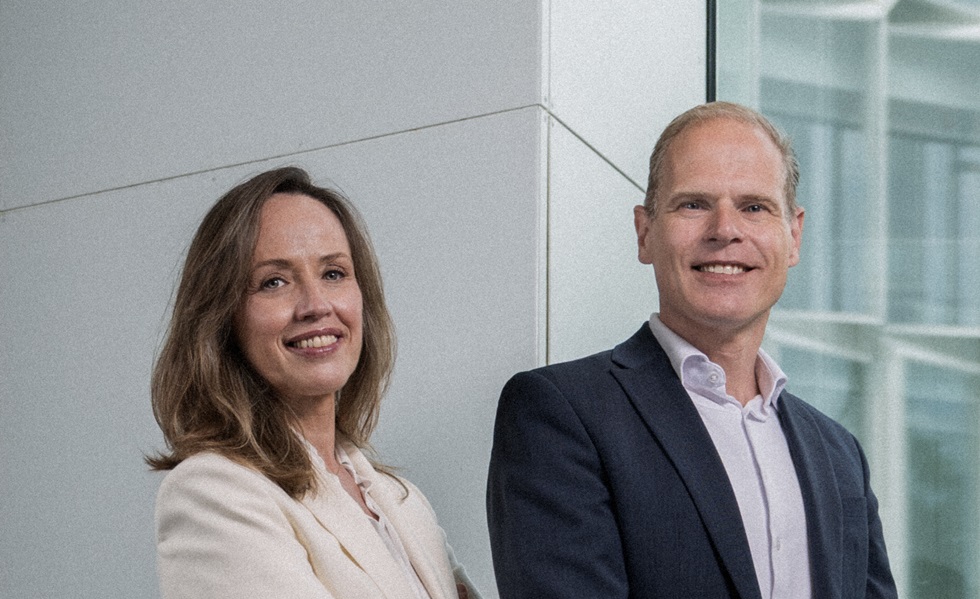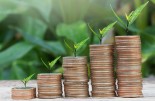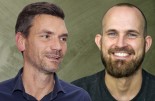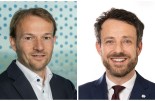Patrick Klijnsmit & Raquel Criado Larrea: Transparent, forward-looking and sustainable asset management
Patrick Klijnsmit & Raquel Criado Larrea: Transparent, forward-looking and sustainable asset management

This interview was originally written in Dutch. This is an English translation.
Sustainable investing has been facing some headwinds lately, but at a.s.r. asset management, sustainability remains the foundation of its strategy. CEO Patrick Klijnsmit and Raquel Criado Larrea, Head of Responsible Investments, explain how they link financial and social value, based on a clear focus and the conviction that engagement yields more than exclusion.
By Michiel Pekelharing
What characterises a.s.r.'s sustainability strategy?
Raquel Criado Larrea: 'What sets us apart is that sustainability at a.s.r. is not separate from our core business. In the insurance industry, everything revolves around the long term, which automatically requires a sustainable approach. Our policy is widely supported, from the Executive Board to the job applicants who come to us. Everyone knows that sustainability is a natural part of our work.'
Patrick Klijnsmit: 'Sustainability is in a.s.r.’s DNA. In 2007, we formalised our policy, partly in response to public debate about investments in controversial sectors. The credit crisis that followed shortly afterwards only reinforced that awareness: as a financial institution, you have a social responsibility. Since then, ESG has not been a separate department or a ‘tick box’, but something that runs through all layers of the organisation. It literally comes up every day at the investment desks and in the discussions we have. That consistency makes us unique and guides all the choices we make.'
What choices did you make in the recent strategy?
Criado Larrea: 'After the integration with Aegon Nederland, we thought together about where we could make the most difference as investors. That led to four focus themes: climate change and energy transition, biodiversity and natural resources, health and well-being, and human rights. We use three approaches for each theme. The first is to reduce negative impact, or ‘reduce harm’. We also help companies transform, which we describe as ‘drive change’. And finally, we actively invest in positive impact, or ‘create impact’. Together, these form a matrix, our compass. It ensures that we don’t get bogged down in isolated initiatives, but contribute to change in a structural way.'
Klijnsmit: 'That focus is essential. As an asset manager, you can't be equally good in every ESG area. By formulating clear themes and approaches, you have a structure that provides guidance. Whether it's a private equity deal or a new engagement process, we always use that matrix to check whether it's right. That makes our choices transparent and well-considered.'
What have you already achieved? And how do you measure that?
Klijnsmit: 'We formulated our first impact goals back in 2018. Not only have we achieved them, we have often exceeded them. In 2024, we have raised the bar again, with the ambition of having at least 10% of our portfolio in impact investments. But we are not making it easy for ourselves. For example, we have determined that a maximum of half of this may be in green bonds. This prevents us from “recycling” impact by shifting existing green bonds. It may require a little more effort, but we really want to create additional impact. In this way, we make a difference for investors and participants in the long term.'
Criado Larrea: 'We look beyond just the climate. For us, social impact is just as important. Think of investments in affordable housing, education and healthcare. To this end, we have also set a sub-target within our impact objective: a minimum of €2 billion in our social focus themes. A good example is our participation, through a fund, in a company that makes mental health more accessible, especially for younger generations.'
Why do you focus primarily on CO2 intensity?
Criado Larrea: 'CO2 is measurable, comparable and internationally recognised. That is why we have chosen CO2 intensity as an important benchmark. It says a lot about the actual impact that a company or portfolio has. Of course, there are other themes, such as biodiversity or inclusion, but there are no uniform measurement methods for these yet. That does not mean that we ignore these issues, however. On the contrary, we are working with the scientific community and sector initiatives to develop new benchmarks to make them measurable in the future.'
Klijnsmit: 'Our goal is to be completely net-zero by 2045, with an important interim target of a 25% reduction in CO2 intensity by 2030 compared to 2023. That is ambitious, but we believe it is achievable. We would never have written it down if it were unrealistic, and on the other hand, we don't want to set the bar too low. At the same time, we are dependent on the social context. If governments were to decide to reverse climate policy and their own climate ambitions, it would become complicated. But as long as that context cooperates, we are confident that we will achieve the objectives.'
How do you deal with the political and social headwinds for ESG investments in some parts of the world?
Klijnsmit: 'We are seeing a counter-movement emerging, certainly from the United States. Major parties are withdrawing from climate agreements or net zero initiatives. That may cause friction in the short term, but our conviction is rock solid: responsible investment is also economically necessary. Look at the increasing cost of damage caused by climate change – from floods to hailstorms – which has a direct financial impact. For us, the message is clear: sustainable investing is not only good for the world, it is also the wisest choice for the long term.'
Criado Larrea: 'Incidentally, this headwind also offers opportunities. When some parties withdraw, opportunities arise to invest in projects that are temporarily less popular but remain essential in the long term. Of course, this requires courage and a sound assessment framework. We always take a fundamental view: what is changing in society and what role can we play in that? Engagement is perhaps the most powerful way to stimulate change. We don't immediately exclude companies, but engage in dialogue with them. For us, real-world impact is not black and white. Sometimes it means helping a company transform from “brown to green”. That is precisely what can make the most difference in the long term. And we don't just mean in terms of the environment. A good example is our engagement with fast food chains, where we are committed to promoting healthier options on the menu. We are not concerned with the company abandoning its business model, but rather with ensuring that healthy alternatives are available and that vulnerable target groups, such as children, are taken into account. These kinds of nuances make all the difference.'
Klijnsmit: 'Exclusion is sometimes necessary, but it is really a last resort. We much prefer to focus on engagement, because that can really lead to transformation. We try to bring back the ‘fun in ESG’. It is more enjoyable to involve companies in the change than to simply turn our backs on them. Ultimately, that delivers more value for both society and our clients.'
How do you ensure a good balance between financial and sustainable returns for clients and participants?
Klijnsmit: 'Our customers expect both a good return and responsible investment. These interests go hand in hand. We have decades of experience in asset-liability management, so we know how to optimally combine returns, risk and obligations. It is not our job to pursue only the highest financial returns, but neither is it to invest solely on idealistic grounds. It's all about balance. We don't invest everything in wind turbines, but spread our investments across sectors and themes so that we are also robust in the short term.'
Criado Larrea: 'For us, sustainability is also an economic issue. If you exhaust the world's resources, you will inevitably be presented with the bill. The reverse is also true: if you are too idealistic and lose sight of returns, funding will dry up and you will not be able to make a new impact. So we always look at both sides: social and financial returns.'
Developments in sustainable investment are happening fast. How do you ensure that you keep up, or better still, stay ahead?
Criado Larrea: 'Innovation is crucial to being a leader. That is why we work closely with partners outside our own organisation. For example, we are working with the Plastic Soup Foundation to investigate how to better measure the impact of plastic. And together with the University of Amsterdam, we have set up a research centre that focuses on ESG data and artificial intelligence. This means that PhD students and researchers work directly with our investment team. This not only provides us with practical insights, but also the sector as a whole, and it helps science to get closer to practice.'
Klijnsmit: 'We definitely don't see ESG as a competition. Of course, we're proud when we win awards, but ultimately we have to do this together. As a sector, we have a responsibility to take steps together. That's why we're happy to share knowledge and insights, including with other parties. This collaboration makes us all stronger and accelerates the change that is needed.'
What are you most looking forward to when you look to the future?
Klijnsmit: 'What gives me the most energy is innovation. We are now familiar with wind turbines and solar panels, but the next steps are coming: battery technology, smart energy grids, new solutions in healthcare. As investors, we can contribute to breakthroughs that we may not even know are coming yet. That journey of discovery is what makes this work so exciting.'
Criado Larrea: 'For me, sustainability is not just a story of crises and doom scenarios. Of course, the challenges are enormous, but there are also many inspiring initiatives and entrepreneurs who are making the world a better place. We can contribute to that, and that is very rewarding. I love the fact that our work is not just about figures and returns, but also about meaning, the future and, above all, the world in which participants will soon be living.'
|
Raquel Criado Larrea Raquel Criado Larrea has been working at a.s.r. asset management as head of Responsible Investing since 2009. In that role, she is responsible for drawing up and implementing the responsible investing policy. Prior to that, Raquel held various other positions within ING Group and General Electric. She obtained a Master of Laws (LL.M.) from the University of Salamanca, including International Law at Leiden University, and an MBA from ESADE in Barcelona. |
|
Patrick Klijnsmit Patrick Klijnsmit has been CEO of a.s.r. vermogensbeheer since 1 April 2023. After starting at the mortgage company of Stad Rotterdam Verzekeringen, he progressed within a.s.r. to become CFO Vermogensbeheer and Director of Finance, Risk & Performance Management, among other positions. He studied business economics and fiscal economics at the University of Amsterdam, where he also obtained his PhD. |









